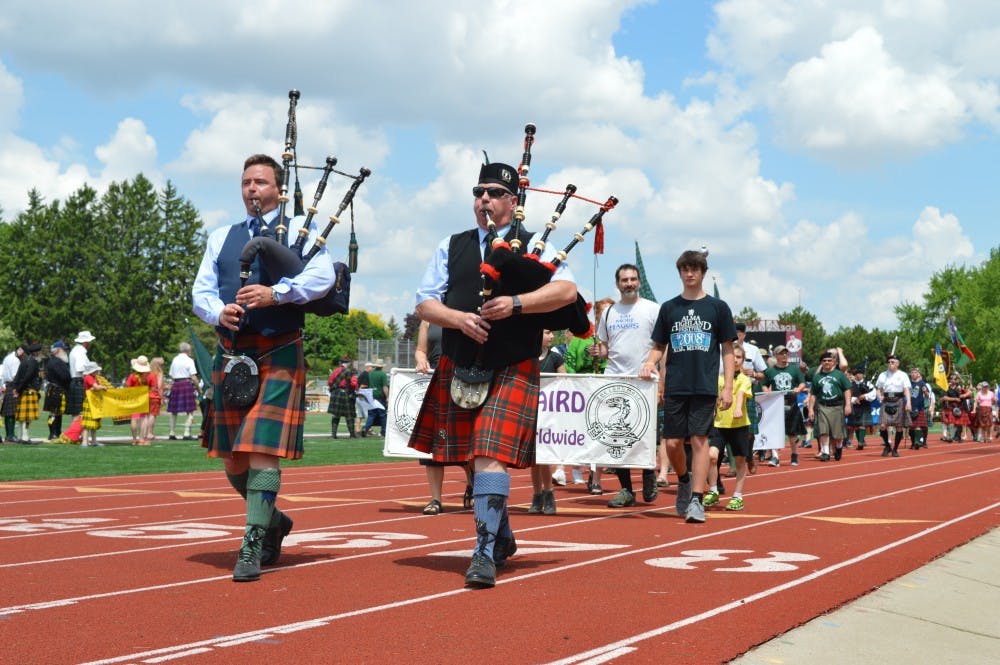Thousands of people brought together to celebrate Scottish culture at Alma Highland Festival
Alma's Highland Festival brought together a community of thousands of people on May 27 to 'Scotland, USA,' also known as Alma College, to celebrate their shared appreciation of Scottish culture and tradition.
The festival was founded in 1968 with the hopes that it would unite Alma College with its surrounding community by celebrating their Scottish heritage. For the last 50 years, people from all of North America have come to Alma indulge in Scottish traditions and flaunt their heritage with pride, and this year was no different.
A sea of plaid kilts filled Bahlke Field as the Parade of Titans, which is a parade of the Scottish clans, and the massed band performance kicked off the weekend's celebrations. The large audience cheered as nearly 500 pipers who made up the 16 massed bands all played and marched together.
"Every year, I'm so happy to see Alma transformed into a community within a community where people across North America can come together and see familiar faces," the festival's President, Kirsten Simmons, said to the crowd.
Many of the festival-goers have attended the Alma festival for several years, such as the 30 Scottish clans who set up festive tents that show-off aspects of their clan in the festival's clan area. The idea of Scottish clans began hundreds of years ago for defense, but many Scottish people still strongly revere their clans, which creates a strong sense of community.
The clans provide a feeling of kinship and shared heritage, many of them with family origin signs outside of their tents for people to look at and see if they are able to trace their own family history back to the same clan.
Gary Graham, a member of the Graham clan, has been attending the Alma Highland Festival, as well as many other Highland festivals around the country, for ten years. The Gross Pointe native said he often sees the same people at festivals year after year.
"The people that come are a lot of the same people, and they all look forward to the games every year," Graham said. "We even see some familiar faces when we go to some of the games in Florida."
Throughout the day, attendees could watch traditional Scottish heavyweight athletic competitions such as the Scottish hammer throwing, the caber toss, the sheave toss, or the open stone, which is very similar to shot put in track and field.
On the east side of Alma's campus, festival-goers could enjoy Border Collie shows and watch energetic and speedy Border Collies herd sheep. Ann Arbor resident Jim Valley brings his dogs and sheep to several festivals for demonstrations because he enjoys showing other people how he trains his dogs and what they're capable of.
"We just want to help keep the heritage alive," Valley said. "So many commercial farms use tractors and four-wheelers in place of what the dogs can do, so it's really about keeping the heritage alive."
Several tents along the edge of the festival sold handmade goods, ranging from intricate silver jewelry and soap made from honey, to Scottish shortbread.
Muskegon resident Dan Hooker is a co-owner of the "Two Old Stoners" stone and jewelry company and has been setting up a jewelry tent at the Alma festival for seven years. He said he comes not only because he gets thousands of customers and it's great for business, but for the atmosphere.
"It's a beautiful festival, it's so busy and full of friendly people. It's always a fun time," he said.
The food section of the festival was stuff with food trucks offering everything from authentic Scottish food to Greek gyros, Mexican Street tacos, and Mount Pleasant's own Dog Central.
Near the food area, was a demonstration tent for Chef Eric William McBride, known as the Celtic Caterer, who has come to the festival for six years. The Denver, Colorado thinks of himself as a 'historical chef', because he travels around the country not only teaching people how to cook truly authentic Celtic dishes, but about the culture behind it.
"I'm on a crusade to teach people what Celtic cuisine really is," McBride said. "It's a cuisine that most people know about, but they don't know about it. They may have had some variations of these dishes, but they don't know the history behind it."
When asked what he likes about the Alma Highland Festival in particular, McBride smiled and said that was simple: the people.
"They like what I'm doing, and they're always so friendly and excited to learn about what I do. It's totally different than anywhere else in the country."







